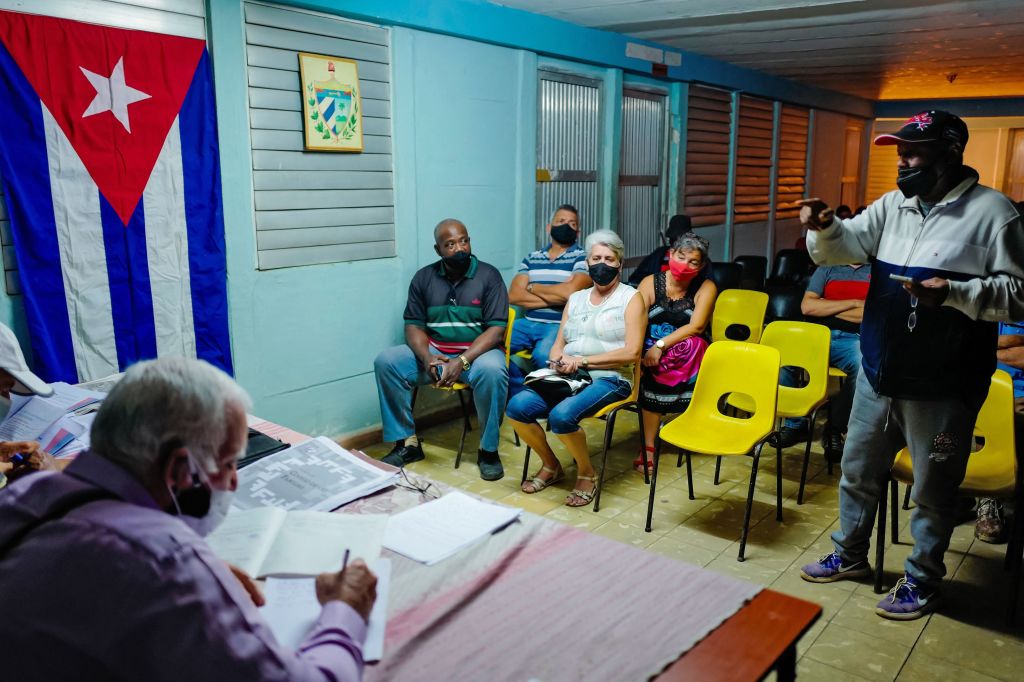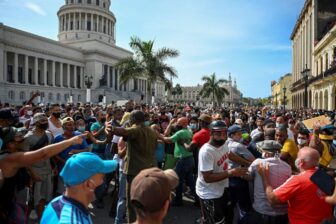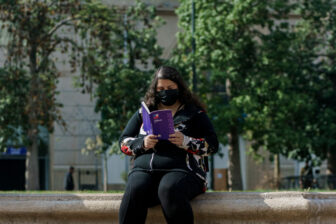
On September 25, Cuba will hold just its fourth national referendum since the 1959 Revolution. The vote, which will decide the fate of the government’s proposed New Family Code, is generating intense debate. Many voters will cast their ballots based not on the content of the Code, but rather their views on the government and the referendum process itself.
Amid a severe economic downturn, much of the public is struggling to access medicine, electricity and even a basic diet. Meanwhile, the administration of President Miguel Díaz-Canel is scrambling to improve its international image even as it prosecutes a prolonged crackdown on civil society and political opposition. In the wake of the massive anti-government demonstrations of July 11, 2021, over 1,400 alleged participants have been arrested. All of this has precipitated a massive exodus; record numbers of Cubans are attempting to reach the U.S., Spain and other countries.
Many opponents of the government say they will vote against the Family Code to deny the Díaz-Canel administration a victory that might improve its international image and distract from this backdrop of economic and social crisis. For its part, the government claims noble intentions with the referendum. In the last two referenda on modifications to the constitution, in 2018 and 2019, conservatives prevented marriage equality and other LGBTQ rights from being codified.
Now, the Code would guarantee rights to marriage equality and surrogate pregnancies. It would also codify domestic violence penalties; extend labor rights to those who care full-time for children, the elderly, or people with disabilities; and allow for parental rights to be shared among extended and nontraditional family structures that could include grandparents, stepparents and surrogate mothers.
Those in favor of the Code say it promotes equality by guaranteeing basic rights. Some opponents cite religious objections or discomfort with shifting gender roles or identities, while others are concerned about the Code’s language around child abuse and education. It would outlaw corporal punishment or “any other kind of violence, abuse or inappropriate forms of discipline.” It also includes a parental duty to educate children to respect authorities and “love of family,” “the homeland” and “its symbols.” It would also make it easier for anyone to report physical or verbal abuse of minors to law enforcement.
Some fear the government will abuse these stipulations to separate dissidents from their children. The new Penal Code includes a similar stipulation, forbidding anyone from encouraging a minor “not to fulfill their duties related to respect for and love of the homeland.” The government has recently used such laws to incarcerate parents for attempting to homeschool their children.
Critics of the referendum also say that in leaving this decision up to a popular vote, the legislature is abdicating its own responsibility to pass laws that guarantee rights, promote equality and protect minorities. This may serve two purposes, they say. First, if the Code is rejected, the government can simply “wash its hands” of gender and sexuality discrimination and ignore the issue. Second, the act of calling a referendum as opposed to simply passing legislation seems performative. After all, Cuban authorities recently approved the new Penal Code and Decree Law 370, which restricts freedom of expression, without referenda. Critics say the government chose to submit the Family Code to a vote only in order to boost the image of Cuba’s system of “democratic centralism.”
Through this system, the government has sponsored many rounds of discussions about the Code in workplace and local government councils. Officials say they take note of the points made in these discussions and elevate them up decision-making channels. The government has modified its proposal two dozen times, supposedly based on feedback from these discussions. However, there is little transparency in how these decisions are made, and there is no watchdog or auditing body to oversee them. Even so, the government has been praising this system of consultation in the media as its political leadership seeks to show “greater closeness to the people.”
If it passes, the Code will also allow the government to posture as aligned with the international left on gender and LGBTQ issues, even as it continues its crackdown on dissent and freedom of expression. For now, the international community continues to condemn the government’s prosecution and jailing of dissidents, some of them minors, since the July 11 demonstrations.
The Díaz-Canel administration seems bent on improving its reputation—but without softening its repression of political dissent. This may drive many voters who support much of the content of the Code to vote against it.
Turnout is almost always high in Cuba, because authorities generally view abstention as subversive and can easily identify those who don’t vote. This is why most people who wish to protest a vote will turn in blank ballots instead of refusing to cast a ballot. Many others vote in line with the government to avoid the problems that come with being identified as a possible dissident.
When the votes are tallied in the referendum on the Family Code, observers should keep in mind that the results will reflect much more than simply how people feel about its contents.
—
García is head of monitoring, evaluation and impact at the Cuban independent media outlet El Toque and is communications lead at the Transparency and Accountability Initiative







